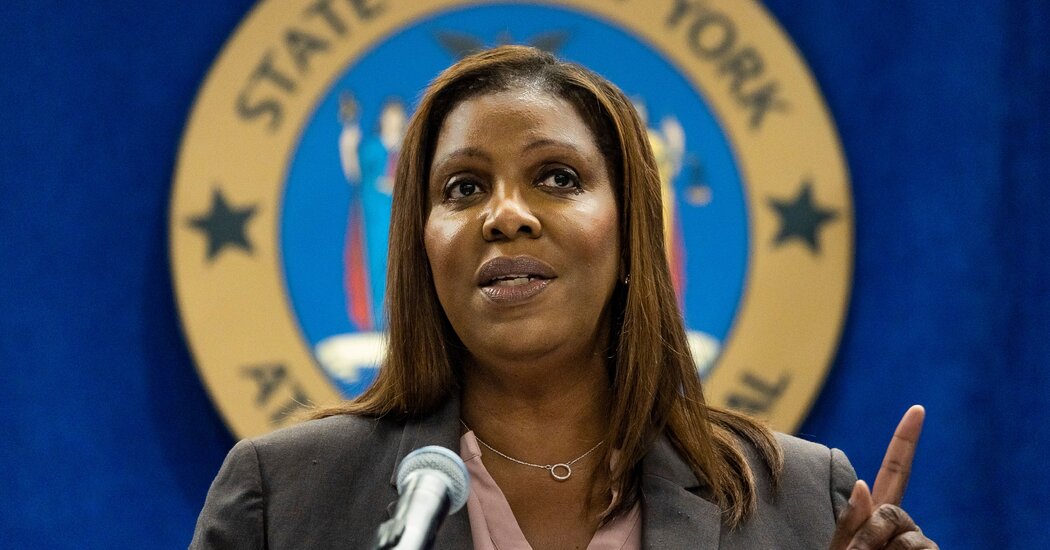
Four state attorneys general have begun looking into the online fund-raising practices of both political parties, specifically seeking information about the use of prechecked boxes to enroll contributors in recurring donation programs that spurred a wave of fraud complaints and demands for refunds last year.
The attorneys general for New York, Minnesota, Maryland and Connecticut have sent letters to WinRed, which processes online donations for Republicans, and ActBlue, its Democratic counterpart, asking for documents related to the practices, according to court documents and people familiar with the matter.
WinRed revealed the existence of the letter from the attorneys general in a Federal District Court filing this week, as the firm is seeking to stop any state-level investigation, arguing federal law should pre-empt any such effort.
The letters were sent in late April, shortly after a New York Times investigation showed how the Trump operation had deployed — and then obscured with extraneous text — prechecked boxes that automatically enrolled contributors into recurring donation programs, taking out money as often as every week. A second prechecked box took out what the campaign called a “money bomb” donation.
The practice caused a surge of credit card fraud complaints and the Trump operation ultimately refunded more than 10 percent of what it raised on WinRed in 2020 — $122 million. The Biden operation refunded a far smaller share of its online 2020 fund-raising: 2.2 percent.
In a letter dated April 29, Letitia James, the New York attorney general, writing on behalf of the four attorneys general, outlined to WinRed the scope of their request for documents. It included a request for any internal documents that might have assessed the effectiveness and impact of prechecked recurring boxes, data on conversion rates, “A/B testing” of its user interface as well as communications about its practices.
“News reports suggest that this practice has led to complaints from consumers and refunds by WinRed,” Ms. James wrote, later adding, “Our offices have significant experience with prechecked solicitations and other forms of ‘negative option’ marketing to consumers. We believe that such solicitations can be inherently misleading, and result in consumers making unwanted and unintended purchases.”
WinRed included a copy of the letter in its federal complaint.
A person familiar with the attorneys general inquiry said that ActBlue had received a matching letter.
In a statement, ActBlue acknowledged that it had received “an inquiry from these attorneys general and worked with them to provide information that responded to their inquiry.” It is not clear what information ActBlue provided.
WinRed has so far resisted the documents request, arguing in a June letter to the attorneys general that oversight of its operations was a federal matter.
Representatives for the four state attorney general offices rejected that argument in a follow-up letter in June, writing: “Laws protect our residents from deceptive, unfair and fraudulent practices in the solicitation of contributions, including the use of prechecked boxes to trap donors into making unintended recurring donations.”
WinRed sought to frame the request for documents as part of a politically motivated inquiry, first telling the Washington Examiner in a statement on Thursday that the four attorneys general — all Democrats — were “exploiting their positions of power for partisan gain.”
“Only when Republicans began challenging the Democrats’ long-held advantage in online fund-raising did these Democrat Attorneys General activate,” the statement said. “It’s troubling to see these AGs attempt to use the power of their offices for the purpose of helping the Democrat Party.”
It appeared that WinRed was not aware that ActBlue had received a similar letter and request for documents.
“The attorney general’s office follows the facts of the law wherever they may lead,” said Delaney Kempner, a spokeswoman for the New York attorney general’s office. “Politics stop at the door, period.”
John Stiles, a spokesman for Keith Ellison, the Minnesota attorney general, echoed the sentiment, saying that consumer protection “falls primarily on the states and knows no political party.”
Representatives for Attorney General William Tong of Connecticut did not immediately respond to a request for comment. The office of Attorney General Brian Frosh of Maryland said in an email, “If WinRed did not mislead or cheat donors in our state, they have nothing to worry about.”
The use of prechecked boxes to automatically enroll donors in recurring donations has become much-debated in political circles in recent months. Following The Times’s investigation, the Federal Election Commission in May unanimously recommended that Congress outlaw the practice, a rare bipartisan moment for an agency often gripped by partisan rancor.
Legislation has since been introduced in both the House and Senate to ban the practice at the federal level, and state legislators in California have introduced a bill to do so in that state.
Starting on July 1, ActBlue informed Democratic campaigns and committees that it would now require any group on the platform that uses prechecked recurring boxes to have explicitly asked donors to give on a recurring basis.




